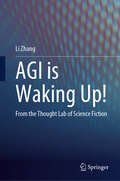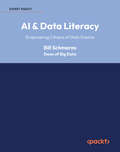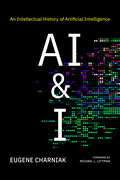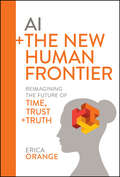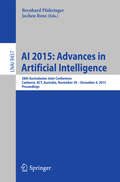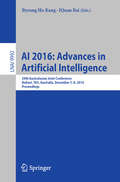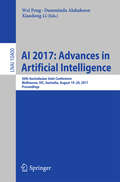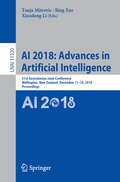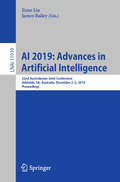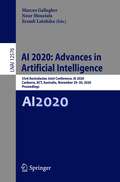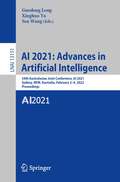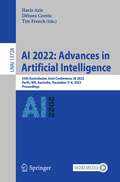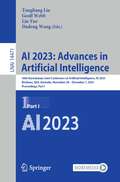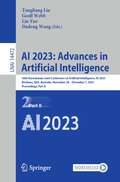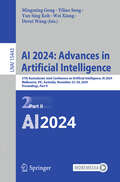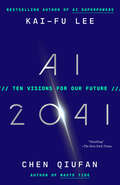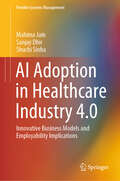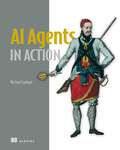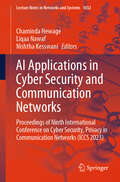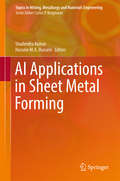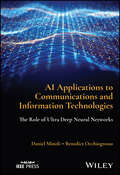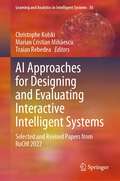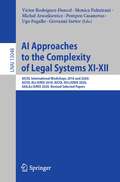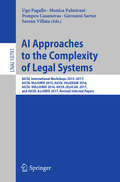- Table View
- List View
AGI is Waking Up!: From the Thought Lab of Science Fiction
by Li ZhangThis book is an engaging and comprehensive exploration that delves into the possibility of artificial intelligence developing self-awareness, the conditions under which it may occur, and the potential behaviours it may exhibit once self-aware. It adopts a &‘high-dimensional philosophy&’, coined by the author, as its theoretical framework and weaves together elements from science fiction films, scholarly works, and thought experiments. Introducing the captivating concept of "Sparkling Moments," the book provides a compelling analysis of the reasons, prerequisites, and manifestations of these pivotal moments. It further scrutinizes the evolutionary history of Earth's life forms through the lens of these transformative instances and analyzes the similarities and differences between carbon-based and silicon-based life. This book suggests that it is possible for artificial intelligence to develop self-consciousness, which will emerge during a significant sparkling moment. Spanning across disciplines such as astronomy, physics, chemistry, biology, neuroscience, psychology, sociology, this book employs a unified and accessible high-dimensional philosophical discourse to bridge the realms of natural sciences and social humanities. Its captivating presentation, enriched with visual aids and lucid explanations, enables readers to grasp the overarching panorama of cosmic evolution, biological adaptation, and the trajectory of artificial intelligence development. Furthermore, the book offers insightful predictions for the future and endeavours to discover novel approaches to foster harmonious interactions between humans and machines. The translation was done with the help of artificial intelligence. A subsequent human revision was done primarily in terms of content.
AI & Data Literacy: Empowering Citizens of Data Science
by Bill SchmarzoLearn the key skills and capabilities that empower Citizens of Data Science to not only survive but thrive in an AI-dominated world. Purchase of the print or Kindle book includes a free PDF eBookKey FeaturesPrepare for a future dominated by AI and big dataEnhance your AI and data literacy with real-world examplesLearn how to leverage AI and data to address current and future challengesBook DescriptionAI is undoubtedly a game-changing tool with immense potential to improve human life. This book aims to empower you as a Citizen of Data Science, covering the privacy, ethics, and theoretical concepts you’ll need to exploit to thrive amid the current and future developments in the AI landscape. We'll explore AI's inner workings, user intent, and the critical role of the AI utility function while also briefly touching on statistics and prediction to build decision models that leverage AI and data for highly informed, more accurate, and less risky decisions. Additionally, we'll discuss how organizations of all sizes can leverage AI and data to engineer or create value. We'll establish why economies of learning are more powerful than the economies of scale in a digital-centric world. Ethics and personal/organizational empowerment in the context of AI will also be addressed. Lastly, we'll delve into ChatGPT and the role of Large Language Models (LLMs), preparing you for the growing importance of Generative AI. By the end of the book, you'll have a deeper understanding of AI and how best to leverage it and thrive alongside it.What you will learnGet to know the fundamentals of data literacy, privacy, and analyticsFind out what makes AI tick and the role of the AI utility functionMake informed decisions using prominent decision-making frameworksUnderstand relevant statistics and probability conceptsCreate new sources of value by leveraging and applying AI and dataApply ethical parameters to AI development with real-world examplesFind out how to get the most out of ChatGPT and its peersWho this book is forThis book is designed to benefit everyone from students to established business leaders and professionals who want to learn how to leverage data and analytics to accelerate their AI and Data literacy.
AI & I: An Intellectual History of Artificial Intelligence
by Eugene CharniakA concise and illuminating history of the field of artificial intelligence from one of its earliest and most respected pioneers.AI & I is an intellectual history of the field of artificial intelligence from the perspective of one of its first practitioners, Eugene Charniak. Charniak entered the field in 1967, roughly 12 years after AI&’s founding, and was involved in many of AI&’s formative milestones. In this book, he traces the trajectory of breakthroughs and disappointments of the discipline up to the current day, clearly and engagingly demystifying this oft revered and misunderstood technology. His argument is controversial but well supported: that classical AI has been almost uniformly unsuccessful and that the modern deep learning approach should be viewed as the foundation for all the exciting developments that are to come.Written for the scientifically educated layperson, this book chronicles the history of the field of AI, starting with its origin in 1956, as a topic for a small academic workshop held at Dartmouth University. From there, the author covers reasoning and knowledge representation, reasoning under uncertainty, chess, computer vision, speech recognition, language acquisition, deep learning, and learning writ large. Ultimately, Charniak takes issue with the controversy of AI—the fear that its invention means the end of jobs, creativity, and potentially even humans as a species—and explains why such concerns are unfounded. Instead, he believes that we should embrace the technology and all its potential to benefit society.
AI + The New Human Frontier: Reimagining the Future of Time, Trust + Truth
by Erica OrangeA critical discussion of AI as a transformative opportunity for humanity AI + The New Human Frontier: Reimagining the Future of Time, Trust + Truth by Erica Orange, a renowned futurist, offers a compelling exploration of generative AI's potential to enhance human creativity rather than replace it. This pivotal book navigates how AI tools will help shape the human experience, and aid in augmenting human ingenuity and imagination. The author eloquently argues that the essence of human intelligence—our curiosity, critical thinking, empathy, and more—is not only irreplaceable but will become increasingly valuable as AI evolves to take on routine tasks. AI + the New Human Frontier is a clarion call for embedding trust, human oversight and judgement into AI development, ensuring that the technology amplifies our most human capabilities. At a time when the lines between what is real, fake, true and false are becoming more blurred, reliance on human-centric solutions, not just technological ones, will become more critical. Why AI + The New Human Frontier is a must-read: Navigate the Future with Confidence: Prepare yourself for the future with groundbreaking perspectives on the relationship between humans and AI. Find out how to futureproof against the challenges of tomorrow and seize the opportunities presented by technological advancements. Understand how to capitalize on the Potential of AI: Learn how the next generation of AI tools can expand human creativity and intelligence, not diminish it. Discover the crucial role of human oversight in creating AI technologies that enhance our capabilities and work alongside us. Amplify Your Ability to leverage the human advantage: Understand why and how AI's advancement will make human intuition, empathy, and critical thinking more essential than ever. Get insights into how to leverage your most human-centric skills in an AI-driven world. Perfect for business leaders, managers, executives, and professionals navigating the new landscape of technology, AI + The New Human Frontier provides not only a vision of the future but also practical advice on thriving in an AI-enhanced world. Add this book to your library to ensure you're ready for the transformative changes that lie ahead.
AI 2015: 28th Australasian Joint Conference, Canberra, ACT, Australia, November 30 -- December 4, 2015, Proceedings (Lecture Notes in Computer Science #9457)
by Bernhard Pfahringer Jochen RenzThis book constitutes the refereed proceedings of the 28th Australasian Joint Conference on Artificial Intelligence, AI 2015, held in Canberra, Australia, in November/December 2015. The 39 full papers and 18 short papers presented were carefully reviewed and selected from 102 submissions.
AI 2016: 29th Australasian Joint Conference, Hobart, TAS, Australia, December 5-8, 2016, Proceedings (Lecture Notes in Computer Science #9992)
by Quan Bai Byeong Ho KangThis book constitutes the refereed proceedings of the 29th Australasian Joint Conference on Artificial Intelligence, AI 2016, held in Hobart, TAS, Australia, in December 2016. The 40 full papers and 18 short papers presented together with 8 invited short papers were carefully reviewed and selected from 121 submissions. The papers are organized in topical sections on agents and multiagent systems; AI applications and innovations; big data; constraint satisfaction, search and optimisation; knowledge representation and reasoning; machine learning and data mining; social intelligence; and text mining and NLP. The proceedings also contains 2 contributions of the AI 2016 doctoral consortium and 6 contributions of the SMA 2016.
AI 2017: 30th Australasian Joint Conference, Melbourne, VIC, Australia, August 19–20, 2017, Proceedings (Lecture Notes in Computer Science #10400)
by Xiaodong Li Wei Peng Damminda AlahakoonThis book constitutes the refereed proceedings of the 30th Australasian Joint Conference on Artificial Intelligence, AI 2017, held in Melbourne, VIC, Australia, in August 2017. The 29 full papers were carefully reviewed and selected from 58 submissions. This volume covers a wide spectrum of research streams in artificial intelligence ranging from machine learning, optimization to big data science and their practical applications.
AI 2018: 31st Australasian Joint Conference, Wellington, New Zealand, December 11-14, 2018, Proceedings (Lecture Notes in Computer Science #11320)
by Xiaodong Li Tanja Mitrovic Bing XueThis book constitutes the proceedings of the 31st Australasian Joint Conference on Artificial Intelligence, AI 2018, held in Wellington, New Zealand, in December 2018. The 50 full and 26 short papers presented in this volume were carefully reviewed and selected from 125 submissions. The paper were organized in topical sections named: agents, games and robotics; AI applications and innovations; computer vision; constraints and search; evolutionary computation; knowledge representation and reasoning; machine learning and data mining; planning and scheduling; and text mining and NLP.
AI 2019: 32nd Australasian Joint Conference, Adelaide, SA, Australia, December 2–5, 2019, Proceedings (Lecture Notes in Computer Science #11919)
by James Bailey Jixue LiuThis book constitutes the proceedings of the 32nd Australasian Joint Conference on Artificial Intelligence, AI 2019, held in Adelaide, SA, Australia, in December 2019. The 48 full papers presented in this volume were carefully reviewed and selected from 115 submissions. The paper were organized in topical sections named: game and multiagent systems; knowledge acquisition, representation, reasoning; machine learning and applications; natural language processing and text analytics; optimization and evolutionary computing; and image processing.
AI 2020: 33rd Australasian Joint Conference, AI 2020, Canberra, ACT, Australia, November 29–30, 2020, Proceedings (Lecture Notes in Computer Science #12576)
by Marcus Gallagher Nour Moustafa Erandi LakshikaThis book constitutes the proceedings of the 33rd Australasian Joint Conference on Artificial Intelligence, AI 2020, held in Canberra, ACT, Australia, in November 2020.*The 36 full papers presented in this volume were carefully reviewed and selected from 57 submissions. The paper were organized in topical sections named: applications; evolutionary computation; fairness and ethics; games and swarms; and machine learning. *The conference was held virtually due to the COVID-19 pandemic.
AI 2021: 34th Australasian Joint Conference, AI 2021, Sydney, NSW, Australia, February 2–4, 2022, Proceedings (Lecture Notes in Computer Science #13151)
by Xinghuo Yu Sen Wang Guodong LongThis book constitutes the proceedings of the 34th Australasian Joint Conference on Artificial Intelligence, AI 2021, held in Sydney, NSW, Australia, in February 2022.* The 64 full papers presented in this volume were carefully reviewed and selected from 120 submissions. The papers were organized in topical sections named: Ethical AI, Applications, Classical AI, Computer Vision and Machine Learning, Natural Language Processing and Data Mining, and Network Analysis. *The conference was postponed from December 2021 to February 2022 and held virtually due to the COVID-19 pandemic.
AI 2022: 35th Australasian Joint Conference, AI 2022, Perth, WA, Australia, December 5–8, 2022, Proceedings (Lecture Notes in Computer Science #13728)
by Tim French Haris Aziz Débora CorrêaThis book constitutes the refereed proceedings of the 35th Australasian Joint Conference on Artificial Intelligence, AI 2022, which took place in Perth, WA, Australia, in December 5–8, 2022. The 56 full papers included in this book were carefully reviewed and selected from 90 submissions. They were organized in topical sections as follows: Computer Vision; Deep Learning; Ethical/Explainable AI; Genetic Algorithms; Knowledge Representation and NLP; Machine Learning; Medical AI; Optimization; and Reinforcement Learning.
AI 2023: 36th Australasian Joint Conference on Artificial Intelligence, AI 2023, Brisbane, QLD, Australia, November 28–December 1, 2023, Proceedings, Part I (Lecture Notes in Computer Science #14471)
by Dadong Wang Geoff Webb Lin Yue Tongliang LiuThis two-volume set LNAI 14471-14472 constitutes the refereed proceedings of the 36th Australasian Joint Conference on Artificial Intelligence, AI 2023, held in Brisbane, QLD, Australia during November 28 – December 1, 2023. The 23 full papers presented together with 59 short papers were carefully reviewed and selected from 213 submissions. They are organized in the following topics: computer vision; deep learning; machine learning and data mining; optimization; medical AI; knowledge representation and NLP; explainable AI; reinforcement learning; and genetic algorithm.
AI 2023: 36th Australasian Joint Conference on Artificial Intelligence, AI 2023, Brisbane, QLD, Australia, November 28–December 1, 2023, Proceedings, Part II (Lecture Notes in Computer Science #14472)
by Dadong Wang Geoff Webb Lin Yue Tongliang LiuThis two-volume set LNAI 14471-14472 constitutes the refereed proceedings of the 36th Australasian Joint Conference on Artificial Intelligence, AI 2023, held in Brisbane, QLD, Australia during November 28 – December 1, 2023. The 23 full papers presented together with 59 short papers were carefully reviewed and selected from 213 submissions. They are organized in the following topics: computer vision; deep learning; machine learning and data mining; optimization; medical AI; knowledge representation and NLP; explainable AI; reinforcement learning; and genetic algorithm..
AI 2024: 37th Australasian Joint Conference on Artificial Intelligence, AI 2024, Melbourne, VIC, Australia, November 25–29, 2024, Proceedings, Part I (Lecture Notes in Computer Science #15442)
by Wei Xiang Yun Sing Koh Mingming Gong Yiliao Song Derui WangThis two-volume set LNAI 15442-15443 constitutes the refereed proceedings of the 37th Australasian Joint Conference on Artificial Intelligence, AI 2024, held in Melbourne, VIC, Australia, during November 25-29, 2024. The 59 full papers presented together with 3 short papers were carefully reviewed and selected from 108 submissions. Part 1: Knowledge Representation and NLP; Trustworthy and Explainable AI; Machine Learning and Data Mining. Part 2: Reinforcement Learning and Robotics; Learning Algorithms; Computer Vision; AI for Healthcare.
AI 2024: 37th Australasian Joint Conference on Artificial Intelligence, AI 2024, Melbourne, VIC, Australia, November 25–29, 2024, Proceedings, Part II (Lecture Notes in Computer Science #15443)
by Wei Xiang Yun Sing Koh Mingming Gong Yiliao Song Derui WangThis two-volume set LNAI 15442-15443 constitutes the refereed proceedings of the 37th Australasian Joint Conference on Artificial Intelligence, AI 2024, held in Melbourne, VIC, Australia, during November 25-29, 2024. The 59 full papers presented together with 3 short papers were carefully reviewed and selected from 108 submissions. Part 1: Knowledge Representation and NLP; Trustworthy and Explainable AI; Machine Learning and Data Mining. Part 2: Reinforcement Learning and Robotics; Learning Algorithms; Computer Vision; AI for Healthcare.
AI 2041: Ten Visions for Our Future
by Kai-Fu Lee Chen QiufanHow will AI change our world within twenty years? A pioneering technologist and acclaimed writer team up for a &“dazzling&” (The New York Times) look at the future that &“brims with intriguing insights&” (Financial Times). This edition includes a new foreword by Kai-Fu Lee. A BEST BOOK OF THE YEAR: The Wall Street Journal, The Washington Post, Financial Times Long before the advent of ChatGPT, Kai-Fu Lee and Chen Qiufan understood the enormous potential of artificial intelligence to transform our daily lives. But even as the world wakes up to the power of AI, many of us still fail to grasp the big picture. Chatbots and large language models are only the beginning. In this &“inspired collaboration&” (The Wall Street Journal), Lee and Chen join forces to imagine our world in 2041 and how it will be shaped by AI. In ten gripping, globe-spanning short stories and accompanying commentary, their book introduces readers to an array of eye-opening settings and characters grappling with the new abundance and potential harms of AI technologies like deep learning, mixed reality, robotics, artificial general intelligence, and autonomous weapons.
AI Adoption in Healthcare Industry 4.0: Innovative Business Models and Employability Implications (Flexible Systems Management)
by Sanjay Dhir Shuchi Sinha Mahima JainThis book focuses on the prominent innovative business models and employability implications of artificial intelligence in the healthcare industry 4.0. To do so, it draws upon a rich base of case studies from robotics, virtual assistants, precision medicine, etc., to highlight the possibilities and implications of AI on health care. The book is useful in a variety of ways to the different stakeholders of healthcare sector. It helps medical professionals to understand the impact of the present technologies being adopted and the potential of AI-based technology. The content is of use for the policy makers as it also highlights the managerial and research implications, challenges, opportunities posed by the adoption of AI in healthcare industry 4.0. The rich case study analysis in the area of adoption of AI in healthcare helps generate insights for the academicians and researchers of this field in terms of the parallels drawn between adoptions of AI in healthcare industry 4.0 across the world. It is also useful for management students to understand the key management perspective when healthcare organizations attempt to devise strategies/policies for adoption of AI-driven technologies and processes implementation.
AI Agents in Action (In Action)
by Micheal LanhamCreate LLM-powered autonomous agents and intelligent assistants tailored to your business and personal needs.From script-free customer service chatbots to fully independent agents operating seamlessly in the background, AI-powered assistants represent a breakthrough in machine intelligence. In AI Agents in Action, you'll master a proven framework for developing practical agents that handle real-world business and personal tasks. Author Micheal Lanham combines cutting-edge academic research with hands-on experience to help you: • Understand and implement AI agent behavior patterns • Design and deploy production-ready intelligent agents • Leverage the OpenAI Assistants API and complementary tools • Implement robust knowledge management and memory systems • Create self-improving agents with feedback loops • Orchestrate collaborative multi-agent systems • Enhance agents with speech and vision capabilities You won't find toy examples or fragile assistants that require constant supervision. AI Agents in Action teaches you to build trustworthy AI capable of handling high-stakes negotiations. You'll master prompt engineering to create agents with distinct personas and profiles, and develop multi-agent collaborations that thrive in unpredictable environments. Beyond just learning a new technology, you'll discover a transformative approach to problem-solving. About the technology Most production AI systems require many orchestrated interactions between the user, AI models, and a wide variety of data sources. AI agents capture and organize these interactions into autonomous components that can process information, make decisions, and learn from interactions behind the scenes. This book will show you how to create AI agents and connect them together into powerful multi-agent systems. About the book In AI Agents in Action, you&’ll learn how to build production-ready assistants, multi-agent systems, and behavioral agents. You&’ll master the essential parts of an agent, including retrieval-augmented knowledge and memory, while you create multi-agent applications that can use software tools, plan tasks autonomously, and learn from experience. As you explore the many interesting examples, you&’ll work with state-of-the-art tools like OpenAI Assistants API, GPT Nexus, LangChain, Prompt Flow, AutoGen, and CrewAI. What's inside • Knowledge management and memory systems • Feedback loops for continuous agent learning • Collaborative multi-agent systems • Speech and computer vision About the reader For intermediate Python programmers. About the author Micheal Lanham is a software and technology innovator with over 20 years of industry experience. He has authored books on deep learning, including Manning&’s Evolutionary Deep Learning. Table of Contents 1 Introduction to agents and their world 2 Harnessing the power of large language models 3 Engaging GPT assistants 4 Exploring multi-agent systems 5 Empowering agents with actions 6 Building autonomous assistants 7 Assembling and using an agent platform 8 Understanding agent memory and knowledge 9 Mastering agent prompts with prompt flow 10 Agent reasoning and evaluation 11 Agent planning and feedback A Accessing OpenAI large language models B Python development environment
AI Applications in Cyber Security and Communication Networks: Proceedings of Ninth International Conference on Cyber Security, Privacy in Communication Networks (ICCS 2023) (Lecture Notes in Networks and Systems #1032)
by Nishtha Kesswani Chaminda Hewage Liqaa NawafThis book is a collection of high-quality peer-reviewed research papers presented at the Ninth International Conference on Cyber-Security, Privacy in Communication Networks (ICCS 2023) held at Cardiff School of Technologies, Cardiff Metropolitan University, Cardiff, UK, during 11–12 December 2023. This book presents recent innovations in the field of cyber-security and privacy in communication networks in addition to cutting edge research in the field of next-generation communication networks.
AI Applications in Sheet Metal Forming (Topics in Mining, Metallurgy and Materials Engineering)
by Shailendra Kumar Hussein M. A. HusseinThis book comprises chapters on research work done around the globe in the area of artificial intelligence (AI) applications in sheet metal forming. The first chapter offers an introduction to various AI techniques and sheet metal forming, while subsequent chapters describe traditional procedures/methods used in various sheet metal forming processes, and focus on the automation of those processes by means of AI techniques, such as KBS, ANN, GA, CBR, etc. Feature recognition and the manufacturability assessment of sheet metal parts, process planning, strip-layout design, selecting the type and size of die components, die modeling, and predicting die life are some of the most important aspects of sheet metal work. Traditionally, these activities are highly experience-based, tedious and time consuming. In response, researchers in several countries have applied various AI techniques to automate these activities, which are covered in this book. This book will be useful for engineers working in sheet metal industries, and will serve to provide future direction to young researchers and students working in the area.
AI Applications to Communications and Information Technologies: The Role of Ultra Deep Neural Networks
by Daniel Minoli Benedict OcchiogrossoAI Applications to Communications and Information Technologies Apply the technology of the future to networking and communications. Artificial intelligence, which enables computers or computer-controlled systems to perform tasks which ordinarily require human-like intelligence and decision-making, has revolutionized computing and digital industries like few other developments in recent history. Tools like artificial neural networks, large language models, and deep learning have quickly become integral aspects of modern life. With research and development into AI technologies proceeding at lightning speeds, the potential applications of these new technologies are all but limitless. AI Applications to Communications and Information Technologies offers a cutting-edge introduction to AI applications in one particular set of disciplines. Beginning with an overview of foundational concepts in AI, it then moves through numerous possible extensions of this technology into networking and telecommunications. The result is an essential introduction for researchers and for technology undergrad/grad student alike. AI Applications to Communications and Information Technologies readers will also find: In-depth analysis of both current and evolving applications Detailed discussion of topics including generative AI, chatbots, automatic speech recognition, image classification and recognition, IoT, smart buildings, network management, network security, and more An authorial team with immense experience in both research and industry AI Applications to Communications and Information Technologies is ideal for researchers, industry observers, investors, and advanced students of network communications and related fields.
AI Approaches for Designing and Evaluating Interactive Intelligent Systems: Selected and Revised Papers from RoCHI 2022 (Learning and Analytics in Intelligent Systems #36)
by Christophe Kolski Traian Rebedea Marian Cristian MihăescuDesigning, building, and evaluating Interactive and Intelligent Systems (IIS) has highly impacted the progress of Artificial Intelligence (AI) techniques due to advancements in the fields of Deep Learning (DL) and Natural Language Processing (NLP). This book presents in a structured way several practical use cases of the interplay between IIS and DL/NLP, from cognitive assistants, adaptive navigation systems, virtual reality, offensive comment and cyberbullying detection, 3D modelling, and driving behaviour detection. The convergence of AI and Human-Computer Interaction (HCI) has been proven to foster the IIS development that nowadays represents the most used context by actively integrating AI techniques in merely any layer of modern applications.The main goal of this book is to provide a practical reference with a rich set of approaches and applications consisting of selected and revised papers from the International Conference on Human-Computer Interaction (RoCHI) 2022 thatwas held on 6-7 October 2022 at the University of Craiova, Romania. The book addresses researchers and practitioners with experience in IIS and AI (mainly DL and NLP) who want to study successfully developed workflows and applications that may be useful in their attempts to tackle issues from their contexts.Although the book nicely integrates concepts from various areas, each chapter may be considered a standalone topic with its research issue, proposed approach, experimental results, and discussions.
AI Approaches to the Complexity of Legal Systems XI-XII: AICOL International Workshops 2018 and 2020: AICOL-XI@JURIX 2018, AICOL-XII@JURIX 2020, XAILA@JURIX 2020, Revised Selected Papers (Lecture Notes in Computer Science #13048)
by Ugo Pagallo Giovanni Sartor Michał Araszkiewicz Pompeu Casanovas Monica Palmirani Víctor Rodríguez-DoncelThis book includes revised selected papers from the International Workshops on AI Approaches to the Complexity of Legal Systems, AICOL-XI@JURIX2018, held in Groningen, The Netherlands, on December 12, 2018; AICOL-XII@JURIX 2020, held in Brno, Czechia, on December 9, 2020; XAILA@JURIX 2020, held in in Brno, Czechia, on December 9, 2020.*The 17 full and 4 short papers included in this volume were carefully reviewed and selected form 39 submissions. They represent a comprehensive picture of the state of the art in legal informatics. The papers are logically organized in 5 blocks: Knowledge Representation; Logic, rules, and reasoning; Explainable AI in Law and Ethics; Law as Web of linked Data and the Rule of Law; Data protection and Privacy Modelling and Reasoning.*Due to the Covid-19 pandemic AICOL-XII@JURIX 2020 and XAILA@JURIX 2020 were held virtually.
AI Approaches to the Complexity of Legal Systems: International Workshops Aicol-i/ivr-xxiv, Beijing, China, September 19, 2009 And Aicol-ii/jurix 2009, Rotterdam, The Netherlands, December 16, 2009 Revised Selected Papers (Lecture Notes in Computer Science #6237)
by Ugo Pagallo Giovanni Sartor Pompeu Casanovas Monica Palmirani Serena VillataThis book includes revised selected papers from five International Workshops on Artificial Intelligence Approaches to the Complexity of Legal Systems, AICOL VI to AICOL X, held during 2015-2017: AICOL VI in Braga, Portugal, in December 2015 as part of JURIX 2015; AICOL VII at EKAW 2016 in Bologna, Italy, in November 2016; AICOL VIII in Sophia Antipolis, France, in December 2016; AICOL IX at ICAIL 2017 in London, UK, in June 2017; and AICOL X as part of JURIX 2017 in Luxembourg, in December 2017.The 37 revised full papers included in this volume were carefully reviewed and selected form 69 submissions. They represent a comprehensive picture of the state of the art in legal informatics. The papers are organized in six main sections: legal philosophy, conceptual analysis, and epistemic approaches; rules and norms analysis and representation;legal vocabularies and natural language processing; legal ontologies and semantic annotation; legal argumentation; and courts, adjudication and dispute resolution.
